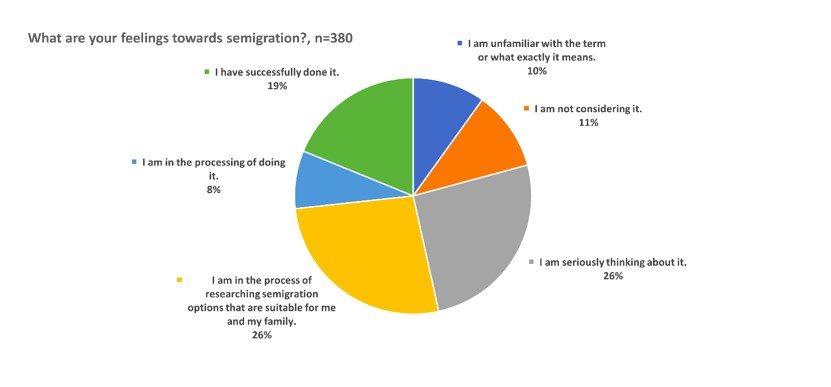Semigration as an emerging trend: South Africans are seeking change and a better lifestyle

As a result, an area of reconsideration has been where people choose to live. There has been noted movement of the working class within the borders of South Africa, giving rise to the ‘buzz word’, semigration.
This movement and trend has been especially noted by the property sector. “Covid-19 forced many companies to re-look the way in which their employees work and they [now] allow their staff to work remotely from home,” says Insights Team from Lead Home1.
Marketing director Ryk Neethling, at the Val de Vie estate in the Cape Winelands, has also noted the trend: “We’ve sold more developer properties in the past month than we did in the whole of 2018 and 2019 combined. [Anecdotal evidence] I get from colleagues is that other estates and developments in the Western and Southern Cape are experiencing the same trends.”2
Taking into consideration these changes, KLA decided to conduct research with a sample of 380 South Africans, using our online YouView panel, to understand this emerging phenomenon of semigration. As part of this study, semigration was defined broadly as: when individuals or families move from one city/town/region to another (in other words, any recent movement within the borders of South Africa).
Considerable appeal for most, but appeal does not necessarily convert to action
The survey results revealed that 52%3 are considering semigrating (either researching the process/options, or seriously thinking about it), only 8%3 are actually in the process of semigrating, while 19%3 of the respondents have successfully done so recently. Amongst those who have semigrated, the majority (93%)4 state that their expectations were met, and are happy that they did it.
Some (10%)5, however, have no desire to semigrate, referring to not wanting to move (55%)5, not being able to afford it (23%)5, not having the flexibility to work remotely (30%)5, and not wanting to uproot their children (20%)5, as their core reasons.

Semigration offers an improved lifestyle and greater balance
Given the trends and shifts of the past few years, as well as renewed interest in mental health and striving for a more balanced lifestyle, South Africans are looking to live the life that they truly desire, realising that their overall wellbeing is the key to living a fulfilled life.
Results of the study show that the bulk of the sample are looking to semigrate in search of a better quality of life (56%)6 or a better lifestyle (47%)6. There is a sense of wanting to reset and start over afresh (38%)6, move away from congestion and traffic (21%)6, seek a slower pace to living (13%)6 and be somewhere with less crime and more security (34%)6.
Upon asking respondents who had successfully semigrated about their new ‘lifestyle’, they had a number of things to express, specifically relating to a positive change to their way of life and immediate environment:
“It’s the best decision I have ever made! Being able to work from anywhere has meant that I have a better quality of life and work has improved drastically. An added bonus is that I have the view of the ocean!”
“The move initially felt like it was big and risky. But I am happy I moved and enjoying my new life.”
“It was totally worth the move. Better job, peace and quiet, and better quality of life.”
“I am happy I moved. There are better job and work opportunities. Better pay. Better quality of life. And I now live in a more vibrant city with easier travel opportunities.”
Better cost of living means more disposable income, resulting in a greater sense of financial well-being. Improved cost of living is also being sought as part of the semigration appeal. About a third of respondents feel that semigration offers them more affordable property prospects, and that their choice of city offers better value for money.
Family connections are just as important, with 45%6 of the respondents citing that a fundamental reason for considering semigration was the desire to be closer to and spend more time with family; having the support of those closest to them, impacts their lives in a positive way.
Another main motivator is more favourable employment conditions
77% of respondents hoping to relocate want better job opportunities, better salaries, but also to find opportunities that will leave them feeling fulfilled and valued.
Those that have been successful add that there has been a positive on their lives. They have been able to create their own path and ways of working that suit their lifestyle. Their employers trust them to be efficient and productive in their own space and time.
Within the broader definition of semigration, movement remains mainly within provinces, but the Western Cape is a desirable destination
A third of respondents who are considering semigration are looking towards the Western Cape as their new home and 28%7 are considering Gauteng. However, there is considerable interest in moving within the province (especially within Gauteng) to either to quieter/smaller towns in outlying areas, or towards bigger cities with more opportunities (more job opportunities and access to better schools). Of the respondents who have successfully semigrated recently, 62%7 moved from a town or city in Gauteng to another town or city within the province, and of those interested in semigrating, 57%7 are in Gauteng and looking to move within the province.
While successful semigration is small, there is considerable interest driven by the desire for improved lifestyle
While a better lifestyle means different things to different people, there is a desire to make improvements, and for many it seems that semigrating may offer them this opportunity. The rate of successful semigration is low, but given the interest, it may grow and emerge as a trend, with South Africans looking to move around the country for better opportunities. For more information visit www.kla.co.za.
References:
1. https://www.leadhome.co.za/blog/2021/03/23/4495/more-south-africans-are-semigrating-heres-why-and-where-they-are-going
2. https://www.news24.com/fin24/economy/semigration-trend-still-in-full-force-and-recent-unrest-may-fuel-more-moves-20210823
3. KLA Panel. No quotas applied. April 2022. n=222
4. KLA Panel. No quotas applied. April 2022. n=72
5. KLA Panel. No quotas applied. April 2022. n=222
6. KLA Panel. No quotas applied. April 2022. n=222
7. KLA Panel. No quotas applied. April 2022. n=222
About the author
- The rise of alternative schooling options in South Africa 22 Oct 2024
- Understanding Gen Z’s perception of fin-fluencers 26 Sep 2024
- Fitness apps are transforming health and wellness in South Africa 10 Sep 2024
- Consumer insights agency, KLA, reveals the quarterly buzz results for Q2 2024 21 Aug 2024
- Babalwa Donkrag appointed managing director at KLA 13 Aug 2024
KLAWe're a full-service market research agency know for taking on client's challenges and working alongside them to find solutions. So, when your business needs intelligence that moves the needle, at KLA, we get it! |